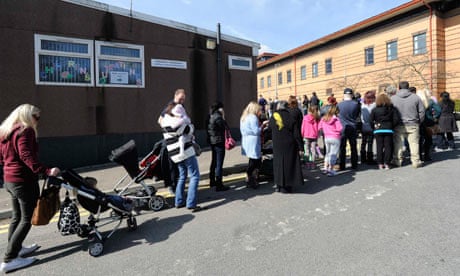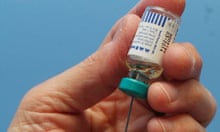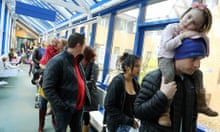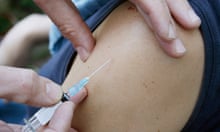Shame is a perilous commodity in public health. A little social stigma keeps everyone in line, but lay it on too thick, and you'll repel people from the measures that are supposed to help them. You can hear the health services in south Wales carefully tracing this boundary as they try to contain the Swansea measles outbreak‚ now at more than 800 cases and possibly, tragically, its first death. The message to the population there is twofold: continue to refuse the MMR, and you put your children in danger and make them a risk to others; but because you're a good parent, you can bring your kids along to a clinic and make everything OK with a short, sharp scratch.
Despite the non-judgmental approach, though, it seems some parents in and around Swansea do feel shame. Earlier this week, I had a brief chat with a researcher who was trying to track down anti-MMR talking heads for a TV report. In an area where at one time, one in five families had eschewed the vaccine, no one was available to explain this collapse in confidence. It was as if they were embarrassed. And this was a problem, explained the researcher, because these opponents were necessary for "balance".
Sixteen years ago, journalists had a much easier job assembling "balanced" stories about MMR in south Wales. When I wrote about the measles outbreak last week, I suggested that it was related to Andrew Wakefield's discredited 1998 Lancet research but the Swansea contagion seems more likely to be the result of a separate scare a year earlier in the South Wales Evening Post. Before 1997, uptake of MMR in the distribution area of the Post was 91%, and 87.2% in the rest of Wales. After the Post's campaign, uptake in the distribution area fell to 77.4% (it was 86.8% in the rest of Wales).
That's almost a 14% drop where the Post had influence, compared with less than 3% elsewhere. In the dry wording of the BMJ, "the [South West Evening Post] campaign is the most likely explanation". In other words, what we can see in Swansea is the local effect of local reporting‚ in all probability, just a taster of what happens when the news irresponsibly creates unfounded terror. The Wakefield effect has yet to hit us.
The Post's current editor, Jonathan Roberts, defends the paper's record: "Our campaign reflected the concerns of parents, it told their stories, it called for answers, it wanted clarity. What it did not do was tell people to avoid immunising their children." But the 1997 coverage focused on a group of families who blamed MMR for various ailments in their children, including learning difficulties, digestive problems and autism‚ none of which have been found to have any connection with the vaccine.
The Post's coverage was at the time deemed a success, and in 1998 it won a prize for investigative reporting in the BT Wales Press Awards. That year, the SWEP ran at least 39 stories related to the alleged dangers of MMR. And yes, it's true that the paper never directly endorsed non-vaccination. What it did do was publicise the idea of "vaccine damage" as a risk, one that parents would then likely weigh up against the risk of contracting measles, mumps or rubella.
And this went beyond the reporting of parental anxieties‚ it was part of the Post's editorial line. One article is entitled "Young bodies cannot take it". The all-important "journalistic balance" was constantly available, thanks to campaigning parents and their solicitor Richard Barr. (It was Barr who engaged Wakefield for a lawsuit, leading to the "fishing expedition" research that became the Lancet paper.) They were happy to provide a quote on the dangers of the "triple jab", which health authorities were then obliged to rebut politely.
The Post also seemed to downplay the risk of measles, reporting on 6 July 1998 that "not a single child has been hit by the illness‚ despite a 13% drop in take-up levels". It's not parents who should feel embarrassed by the Swansea measles outbreak: some may have acted from overt dread at the prospect of harming their child, and some simply from omission, but all were encouraged by a press that focused on non-existent risks and downplayed the genuine horror of the diseases MMR prevents. The shame belongs to journalists: those of the South West Evening Post who allowed themselves to be recruited in the service of a speculative lawsuit, and any who let a specious devotion to "balance" overrule a duty to tell the truth.







